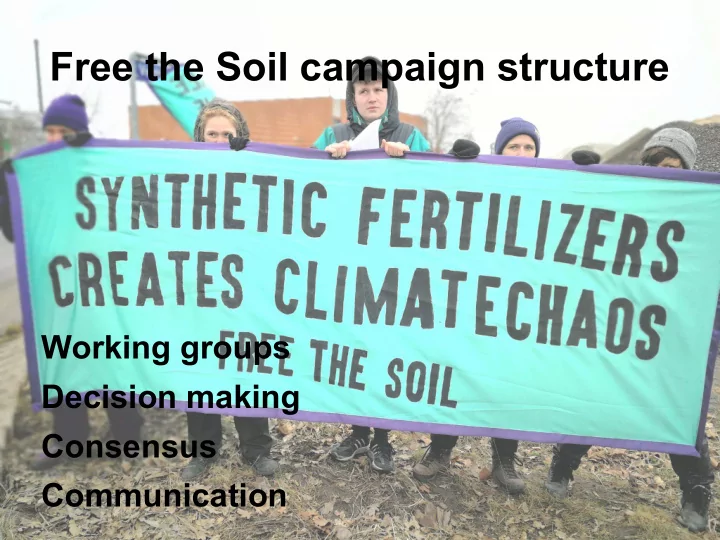

Free the Soil campaign structure Working groups Decision making Consensus Communication
Research WG Other Working groups?
Decision making ● Decisions are taken by consensus ● Big decisions concerning the whole campaign should be taken at the international plenaries – (We aim for 3 big plenaries including this one) ● Working groups have autonomy to take decision within their area of work. ● Decisions within the different working groups that will effect other working groups processes should be taken collectively.
How can working groups bring decisions forward ● Discussion and decision at plenaries ● The working group send out a mail describing the decision and giving time for inputs and concerns ● Temperature checks at plenaries to get a feeling of the general opinion but still keeping the decision power in the working group
Consensus decision making ● Consensus decision making is a way of reaching agreement between all members of a group. ● Instead of simply voting for an item and having the majority of the group getting their way, a group using consensus is committed to finding solutions that everyone actively supports, or at least can live with. ● Consensus decision making ensures that all opinions, ideas and concerns are heard and taken into account. ● Through listening closely to each other, the group aims to come up with proposals that work for everyone. To learn more: https://www.seedsforchange.org.uk/consensus
Consensus decision making ● Stage 1: What's the issue? ● Stage 2: Open up the discussion ● Stage 3: Explore ideas in a broad discussion ● Stage 4: Form a proposal ● Stage 5: Amend the proposal ● Stage 6: Test for agreement – Agree – Conserns – Stand aside – Block ● Stage 7: Work out how to implement
Guidelines for participating in consensus meetings ● Be willing to work towards the solution that's best for everyone, not just what's best for you. ● Help to create a respectful and trusting atmosphere. ● Listen actively to what people are trying to say. Make an effort to understand someone's position and their underlying needs, concerns and emotions. ● Explain your own position as clearly as you can. Be open and honest about the reasons for your view points ● Don't be afraid of disagreement and conflict. Consensus isn't about us all thinking the same thing.
Communication internally ● There is a unencrypted freethesoil maillist that everyone involved with the campaign can join ● There is a freethesoil crabgrass ● Each working group figure out how they would like to communicate internally ● There is a process working group who aim to facilitate and support the process ● Each working group have a contact person in the process working group who can take part in their internal communication
Recommend
More recommend